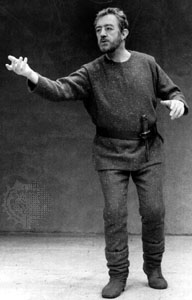This is a big year for Macbeth. There's a new movie out, opens a new window, it gets a callout in Hamilton, opens a new window, and one of the rare First Folios is out on tour in the states, opens a new window. This most recent rendition is the newest of dozens of appearances of the fated king to see the silver (okay, sometimes smaller) screen, and many famed actors have lamented of "tomorrow and tomorrow and tomorrow" creeping from petty places. Orson Welles, Sean Connery, and Patrick Stewart have taken on the role. There's even been an opera.
But why do we always come back to it? Is it the three witches' familiar refrain, opens a new window? The agonizing recognition of ambition gone too far? That we know it's based on a real person, opens a new window? The fact that it is way shorter than Hamlet?
What we do know, is that there have been a lot of different approaches to it, both scholarly and culturally. Not only do we study the words or the history behind it, but we also want to know the effect it's had on people over the past several hundred years. Of course, that includes the 150 year period in which several well-meaning author-thespians decided to...improve...Shakespeare's work. This is a familiar occurrence from Restoration-era Shakespeare, opens a new window, thanks to English theater's near-loss at the beginning of the 17th century and the rules set in place for the production of the material after its return.
Also, you know, no copyright, opens a new window.
Next year, we'll start out with Macbeth #killingit, opens a new window. Then the Macbeth story will be the final in a project involving new novels based on Shakespeare's work, opens a new window. (For now, Jeanette Winterson's The Gap of Time, based on The Winter's Tale is the only one that has been released.)
For now, here's P-Stew.



